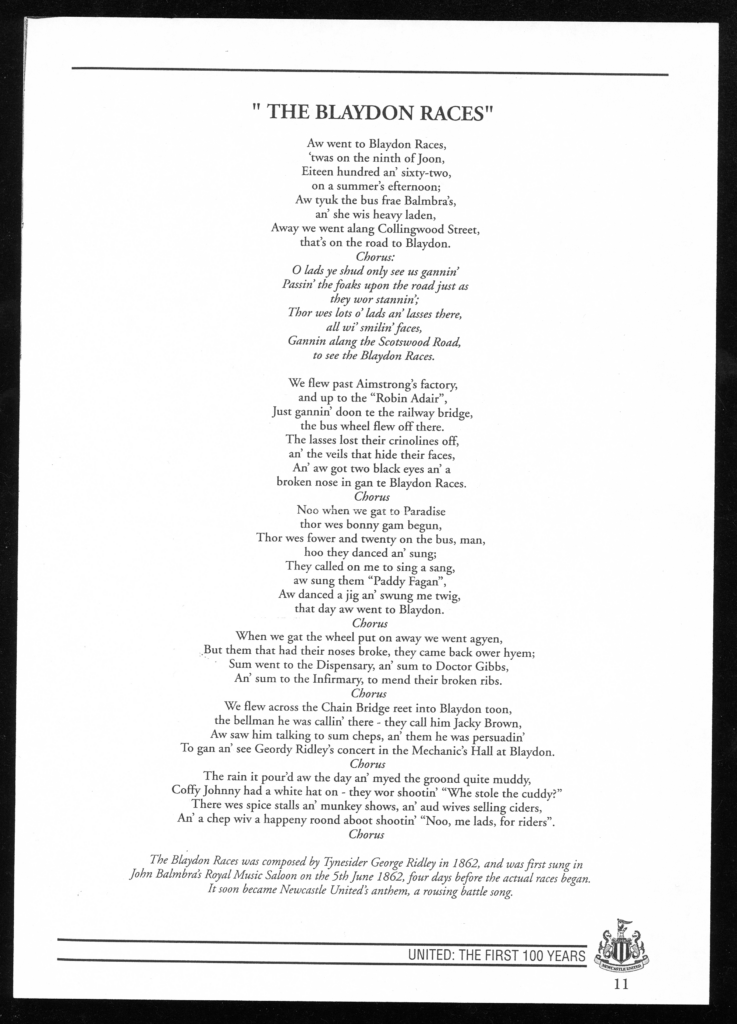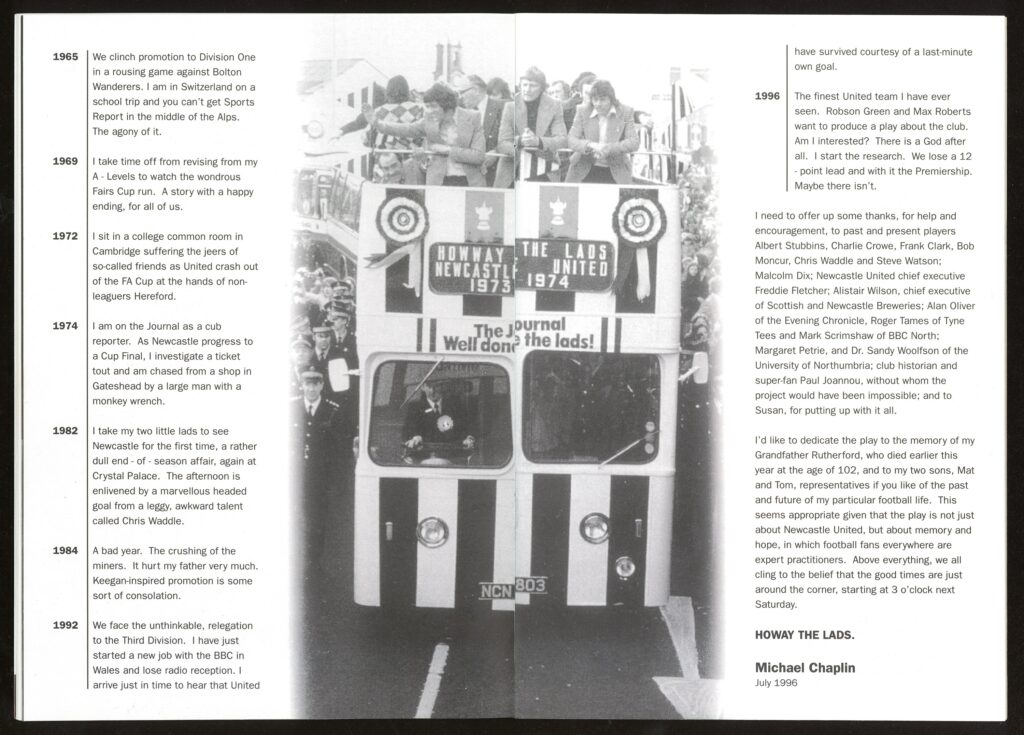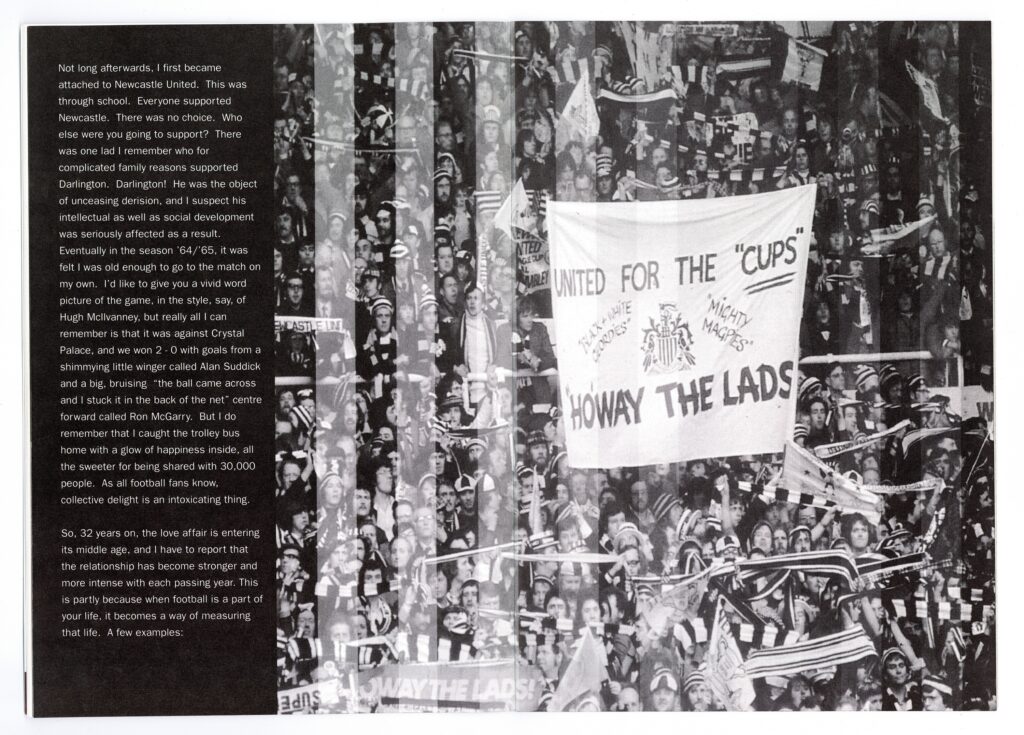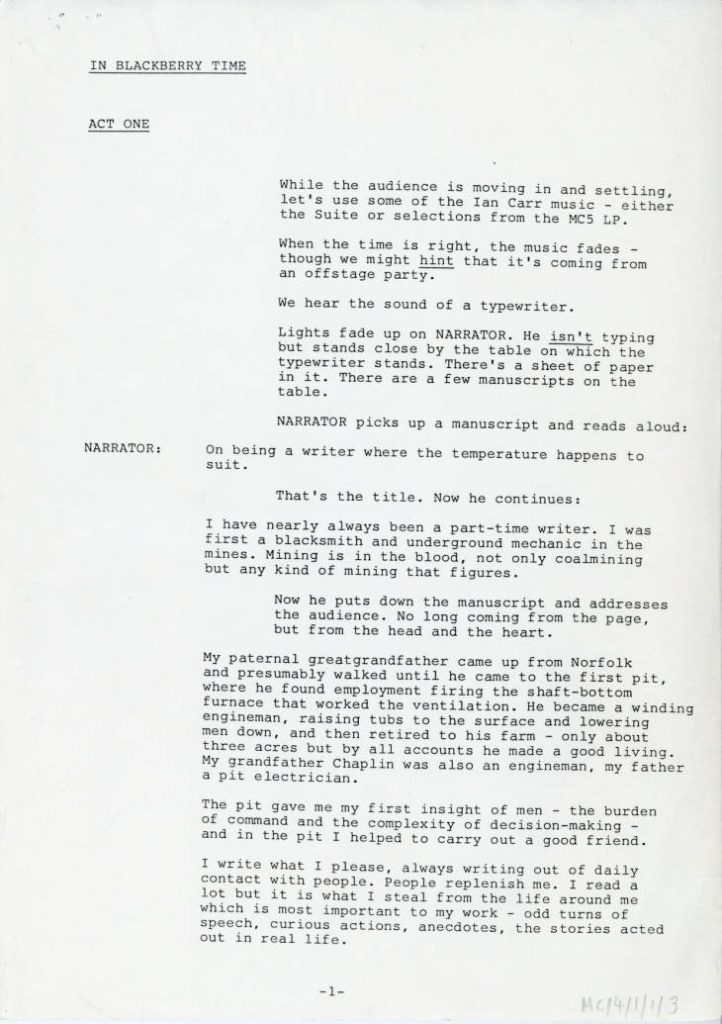If you have lived, worked, or visited the city of Newcastle Upon Tyne during match days, you may have seen the sea of fans, all wearing the iconic black and white shirts. You may have heard the roar of the fans emanating throughout the city whenever a goal is scored, or the fans disagreeing with a decision from the referee. Newcastle is a city proud of its football team. The stadium, affectionally known as the ‘church,’ is central to the culture of this part of the Northeast. As a one team city, the love and at times distain for the club runs deep through Geordie blood. For those new to Newcastle, it is easy to get caught up in the excitement and become an adoring fan. Newcastle United, for those not native to the city, can give a sense of belonging. Michael Chaplin, whose archive is located in Newcastle University Special Collections and Archives, is an example of just that…
Michael Chaplin, born in County Durham, moved to Jesmond in Newcastle as a young boy after his family moved back to the Northeast from Essex, where his father (Sid Chaplin) had been working as a writer. Although he attended schools in the area, his accent was different to those around him made, and often made it hard for him to feel like he belonged. But, whilst playing outside with a friend one day, he heard the Geordie roar from the stadium and became intrigued by what could cause such a sound that reached over a mile away. This was the beginning of his life-long love for Newcastle United and in the future would be the inspiration for some of his works in local live theatre, literature and tv dramas.
Fans of Newcastle United will be familiar with some of the famous chants, such as The Blaydon Races pictured below (part of the Michael Chaplin Archive and used as research material for the theatre production Beautiful Game: The Newcastle United Story). These chants fill the stadium grounds whilst the players are on the pitch. They fill the local pubs while the matches are shown on the tv, and they fill public transport across the country and worldwide when the black and white fans are travelling to support their team. They are vital to the club, urging the team to do well, cementing the love of the team between fans, and showing their rivals that they are serious.
In 1996, Chaplin’s live theatre production Beautiful Game: The Newcastle United Story, was performed at the Theatre Royal in Newcastle. The production told the story of his much-loved club through the eyes of three generations of the Purvis family and includes the trials and triumphs the team faced in the past through to present through affection, humour, and song. The period before had been a hugely successful year at the theatre. It became Newcastle’s first arts institution to receive a substantial National Lottery Award, and after a post-match pint between Robson Green and Max Roberts about Michael’s ideas for the new production, the history of the Newcastle United production was born.
The programme that was produced for Beautiful Game: The Newcastle United Story described how Michael’s love of Newcastle United evolved, with key images and special event dates included (see the images below). This biographical information was later developed into a book called Newcastle United stole my heart. It tells of the growing sense of belonging that was gained from hearing the crowds and attending matches. It tells the story of his own changing life and career. This book is currently on display within the Sid Chaplin and Michael Chaplin Archives exhibition case, near to the exhibition area on Level 2 of the Philip Robinson Library.
The theatre production of Beautiful Game: The Newcastle United Story, was a tremendous success and enticed those that would normally be at a football match, to come to the theatre and enjoy the ‘game’ in a format different to the usual venue.
Local newspapers wrote of the enjoyment of the production and reviewing Chaplin, Roberts and Green highly. These cuttings are a few of many which we hold in the archives. Many of them sing the praises of the trio and tell the individual stories that brought them together for this production.
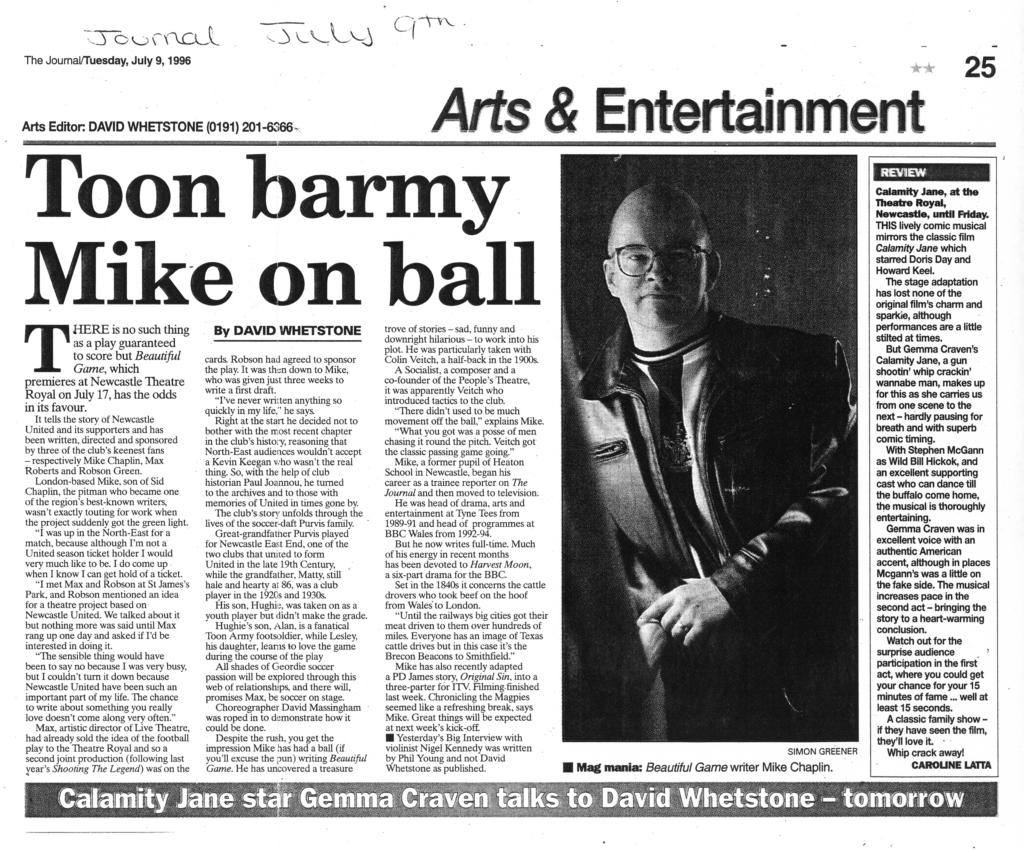
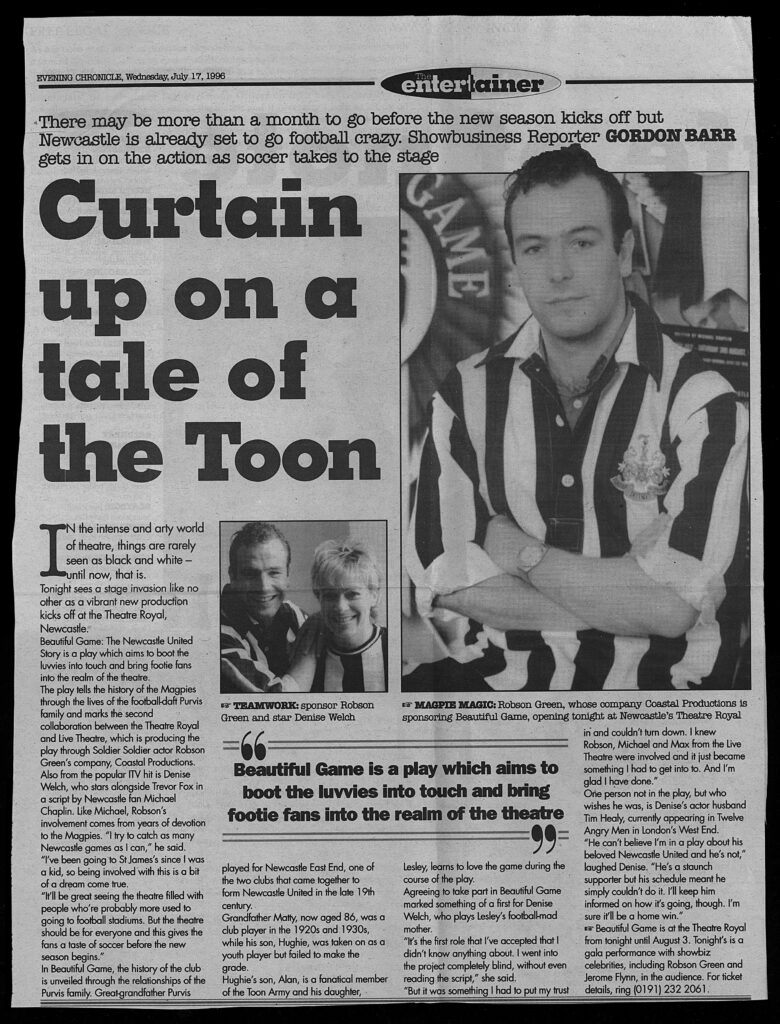
Years later in 2009, a new play was written by Michael Chaplin and his son Tom, titled, You Couldn’t Make It Up. The production told of the story of the current turbulent events of the team they both loved. This ‘script in hand’ style of play was created in line with the theatres theme of real-life stories, with other plays such as From Home to Newcastle being an enormous success. This new production centred around key members of Newcastle United and included the characters of Mike Ashley, Kevin Keegan, and Alan Shearer. Key goals from across the seasons were shown on video during the interval. Unlike the previous Beautiful Game production, which was written as a ‘love letter’ to Newcastle United’s history, this new performance was written and performed in a manner to describe the most recent turmoil the club was facing and expressed how much the fans yearned for change. The programme sold during the performance (images below) was designed with the iconic black and white strips and the magpie (the Northeast icon for the nickname of the Geordie team), with the headline ‘Toon fans Vs the Management.’
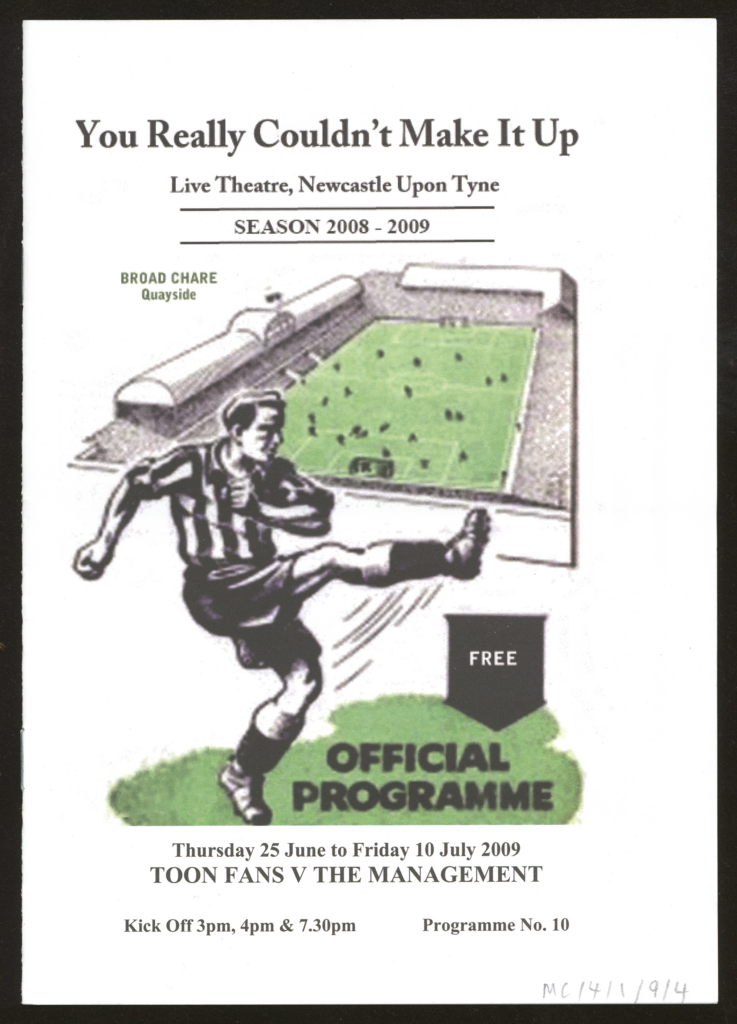
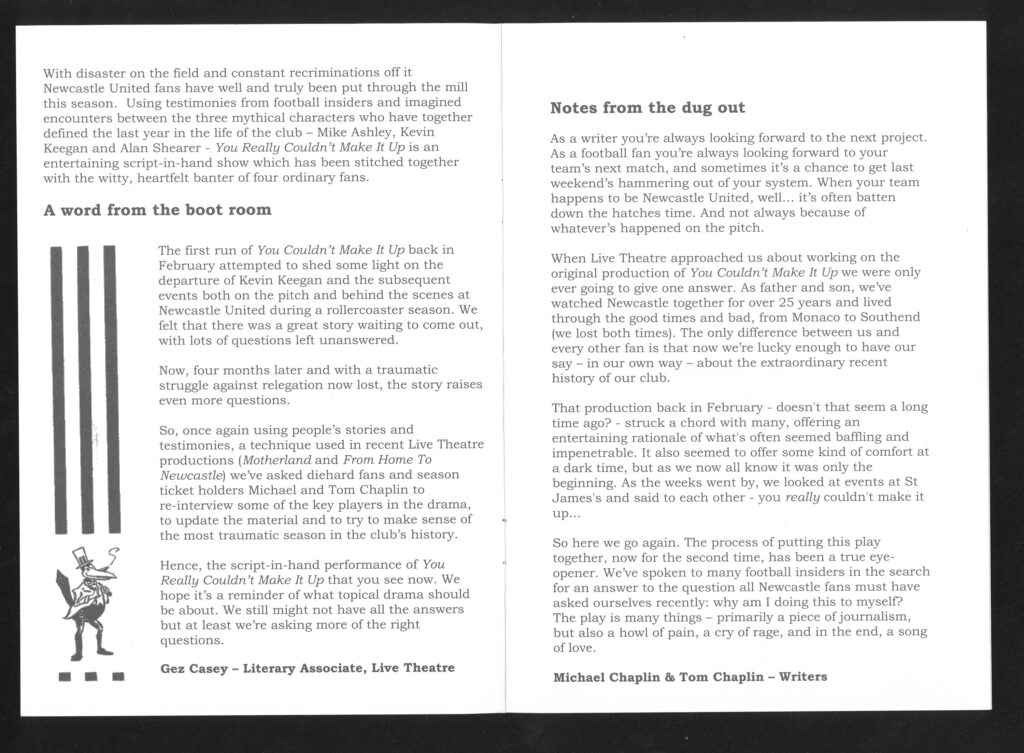
The Michael Chaplin Archive holds scripts, correspondence and some key research material used in the planning process of Chaplin’s journey writing the live theatre plays Beautiful Game and You Just Couldn’t Make It Up, alongside his other successful pieces of work.
Still on the theme of football, but with an entertaining story about a canine, we also hold the archival material for the wonderful drama of Pickles the dog (written by Chaplin and shown on ITV). The story is about the canine that found the stolen World cup in 1966. More information on this can be found here: Pickles – The Dog Who Won the World Cup – Newcastle University Special Collections and Archives (ncl.ac.uk)
If you are interested in Newcastle, football, theatre, television, literature, community and culture, the Michael Chaplin Archive is highly recommended. You can find more information and links below:
- Audio – Michael Chaplin on the Chaplin (Michael) Archive | University Library | Newcastle University (ncl.ac.uk)
- Special Collections archive links – Beautiful Game – Newcastle University Special Collections and Archives (ncl.ac.uk), You Really Couldn’t Make it Up – Newcastle University Special Collections and Archives (ncl.ac.uk),
- External links – Pickles (dog) – Wikipedia, ‘Newcastle United Stole My Heart’ – TV Writer Michael Chaplin’s book is a walk through Magpie wonderland – Chronicle Live

